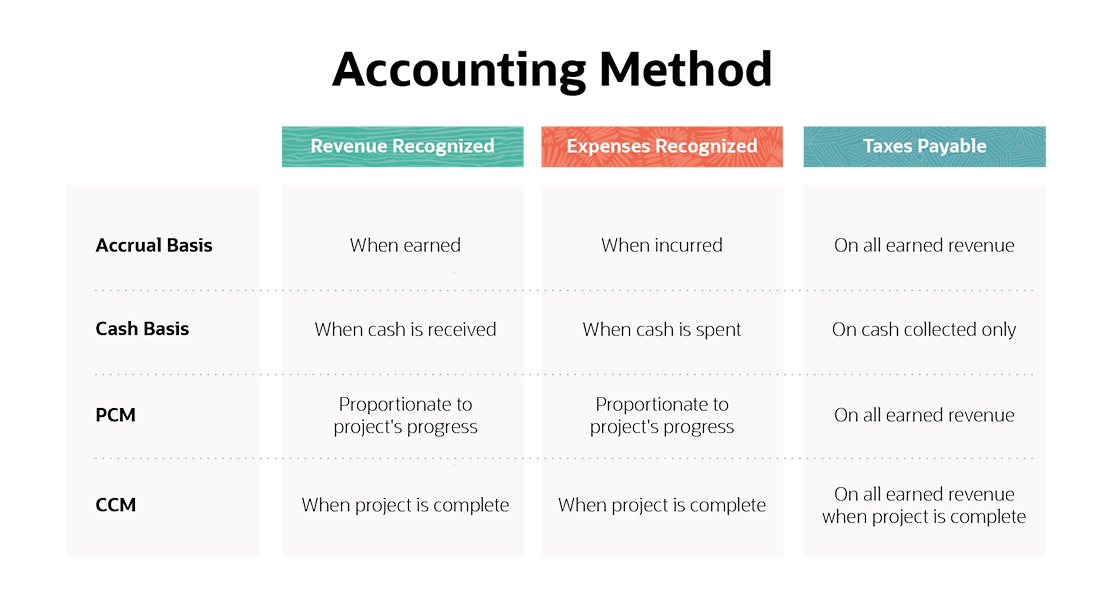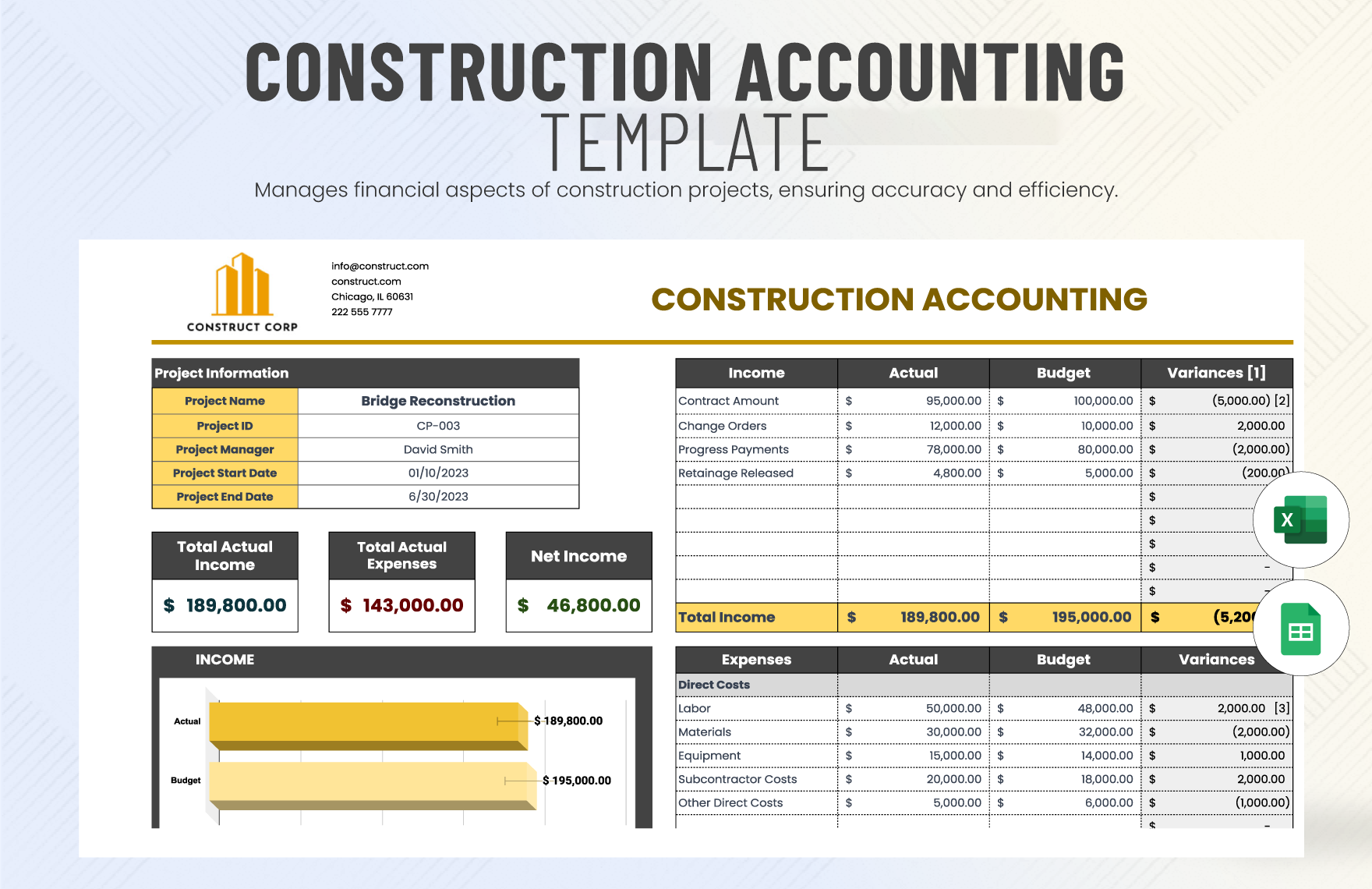Construction Accounting: How to Maintain Accurate Records and Improve Cash Flow
Construction Accounting: How to Maintain Accurate Records and Improve Cash Flow
Blog Article
Comprehending the Relevance of Building Audit for Effective Project Administration

Role of Construction Accounting
Building and construction accounting works as the foundation of monetary administration in the building and construction industry, guaranteeing that projects are finished within budget and economic goals are fulfilled. construction accounting. This customized accounting method addresses the special difficulties faced in building jobs, including differing project durations, varying costs, and multiple stakeholders
Among the main functions of building and construction accountancy is to give precise price estimate and monitoring throughout the project lifecycle. This facilitates enlightened decision-making, enabling task supervisors to adjust sources and timelines successfully. In addition, construction accounting enhances money flow management by monitoring accounts receivable and payable, thus guaranteeing that funds are available for prompt repayments to subcontractors and suppliers.
It furnishes job managers with the essential financial information to prepare thorough financial statements, which are necessary for audits and financial reviews. Inevitably, the function of construction audit expands beyond mere economic monitoring; it is essential to critical preparation and operational effectiveness, driving the success of construction tasks in a competitive landscape.
Trick Parts of Building Audit

Budgeting establishes a monetary framework that overviews project implementation, enabling managers to allocate resources successfully and expect potential monetary obstacles. Exact price tracking is vital for monitoring expenses in real-time, aiding to determine differences in between forecasted and actual expenses. This makes it possible for prompt adjustments to keep the task on budget plan.
Furthermore, economic reporting gives stakeholders with a clear picture of the project's monetary wellness. Normal records, such as revenue and loss declarations and money circulation evaluations, help with notified decision-making and improve openness amongst all parties entailed.
Furthermore, conformity with industry regulations and audit criteria is critical. This makes sure that economic practices are not just effective but additionally authorized, safeguarding the company versus lawful effects. By integrating these essential elements, construction accountancy promotes an organized method to handling funds, eventually contributing to the effective completion of construction projects.
Advantages for Job Managers
Leveraging reliable construction accountancy methods supplies project managers with a multitude of advantages that boost both functional effectiveness and financial oversight. One considerable benefit is improved budget plan management. Accurate monitoring of incomes and expenditures permits project supervisors to check financial performance in actual time, ensuring jobs stay within budget plan and promoting timely adjustments when required.
Additionally, construction accounting simplifies capital administration, enabling job supervisors to expect financial demands and enhance source appropriation. By comprehending money inflows and discharges, they can better manage repayments to subcontractors, staff members, and distributors, therefore preventing costly hold-ups.
Furthermore, durable audit systems offer detailed coverage capabilities. Task managers can create records that offer understandings into task success, price variations, and resource usage. This data-driven strategy fosters notified decision-making, allowing managers to recognize potential problems proactively and apply restorative actions.
Lastly, adherence to building accounting requirements makes certain compliance with legal and governing demands, decreasing the risk of disputes or charges. Generally, reliable construction accountancy equips task managers with the tools required to drive task success, improve stakeholder confidence, and promote lasting business growth.
Usual Challenges in Building And Construction Bookkeeping
Numerous task supervisors encounter significant challenges in building accountancy that can impede job success. One of the main difficulties is the complexity of tracking several job websites, each with distinctive spending plans, timelines, and source allocations. This needs thorough interest to detail, which can be overwhelming without a durable accountancy system in area.
In his explanation addition, changing material prices and labor prices can make complex budget plan administration, making precise projecting hard. Task managers typically struggle to reconcile these prices with real expenditures, causing possible monetary discrepancies.
Moreover, building and construction accounting involves conformity with different regulations, consisting of tax obligations and labor legislations. Navigating these guidelines can be challenging, especially for managers that might not have a solid bookkeeping history.
An additional considerable difficulty is managing money circulation, which is critical in the building and construction sector. Hold-ups in invoicing, repayments from customers, or unforeseen job modifications can produce capital scarcities, endangering the task's progress.
Last but not least, reliable interaction between job supervisors, accountants, and area groups is vital. Misunderstandings can result in incorrect monetary coverage, further complicating project administration efforts. Resolving these challenges proactively is vital for effective building and construction bookkeeping.

Ideal Practices for Effective Audit
While browsing the intricacies of building and construction accounting can be daunting, adopting best methods can significantly boost monetary administration and job success. One basic practice is maintaining accurate and prompt documents. Applying robust bookkeeping software customized to building and construction tasks can enhance data access, invoicing, and coverage, minimizing errors and saving time.
Additionally, developing a clear budget plan Get the facts and routine surveillance against this budget are crucial. Using a system of routine economic testimonials allows project managers to recognize variations early, helping with timely decision-making. It is additionally crucial to separate job costs right into indirect and direct categories, enabling more clear insights right into productivity.
An additional best practice includes fostering open interaction among all stakeholders. Routine updates and collaborative discussions about monetary status can make sure every person is lined up and informed. Training team in construction-specific bookkeeping principles further boosts competency and accuracy.
Last but not least, ensuring conformity with relevant bookkeeping criteria and regulations is non-negotiable. Regular audits and inner reviews add to openness and liability, constructing depend on with stakeholders and customers. By concentrating on these finest methods, building companies can optimize their accounting processes, ultimately driving job success and economic stability.
Conclusion
To conclude, building accounting plays an essential function in making sure effective project administration by assisting in exact monetary oversight and boosting decision-making. By incorporating vital elements such as price estimation, capital management, and compliance, job supervisors can browse typical difficulties and utilize best practices for effective bookkeeping. Eventually, a robust building accountancy structure not only safeguards budget plan stability yet likewise adds to the general financial health of construction projects, fostering lasting success within the sector.
By incorporating like it these vital parts, building and construction accountancy promotes an organized technique to handling monetary resources, eventually adding to the successful conclusion of building jobs.
Precise monitoring of expenditures and earnings enables job managers to check monetary performance in real time, ensuring jobs stay within budget and helping with timely adjustments when necessary.
Task supervisors can generate records that provide understandings right into task success, price differences, and source application.Numerous project supervisors encounter substantial obstacles in building and construction bookkeeping that can hinder project success. construction accounting. Eventually, a robust building audit framework not only safeguards budget plan stability but likewise contributes to the total financial wellness of building tasks, fostering lasting success within the industry
Report this page